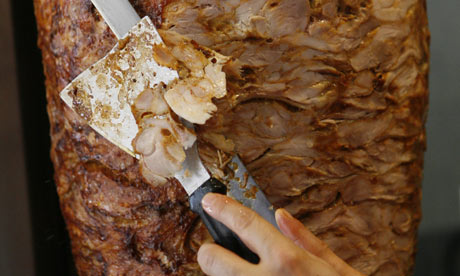
Doner kebabs were never likely to be cornerstones of a calorie-controlled diet, but just reading the contents in samples of the Turkish dish that became a staple of British takeaways may be enough to give you a heart attack.
Food standards officers who analysed nearly 500 kebabs to check meat content, labelling and nutritional value found "shocking" levels of fat and salt, inaccurate labelling of meat and, on average, enough calories to provide half a woman's recommended daily intake.
Six kebabs tested by local councils contained pork, in a dish that originates from a predominantly Muslim country and that many people assume to consist of lamb. Two of these even claimed to be Halal.
The results of the checks on 494 kebabs in pitta bread, collected for 76 local authorities, were revealed by Lacors, their national regulatory body. The average kebab contained almost 6g of salt – the recommended daily limit set by the Food Standards Agency – as well as huge amounts of saturated fat and nearly 1,000 calories.
Some examples contained 1,990 calories, nearly a woman's recommended daily intake, 70g of saturated fat, which is three and half times the women's daily guideline amount, and 16.5g of salt. Five of the 10 most unhealthy kebabs in the study came from south-west England.
The labelling of meat was "disappointingly inaccurate", said the report. Of 323 samples collected with some details from the manufacturers, more than a third contained a different profile of animal species from that on the label. In 15% of the samples, undeclared beef was found, and in 12% undeclared chicken.
The report acknowledges that, despite "these rather astonishing extremes" found in the survey, "doner kebabs will rarely form the main constituent of an individual's diet" and that most people will only eat them very occasionally.
However, Geoffrey Theobald, the chairman of Lacors, said the levels of saturated fat and salt were a serious cause for concern. He added: "It is totally unacceptable that people with certain faiths are unknowingly eating meats that are against their beliefs … This study has turned the spotlight on doner kebabs and we hope that manufacturers rise to the challenge and work with councils to provide a healthier product that contains only what it says on the label."
The FSA has recently launched a drive for food outlets of all kinds to voluntarily display the calories on menus or menu boards. It also plans salt-reduction targets for kebabs but the survey by council officers suggests they at present contain almost twice the target levels for 2010, and two and a half times the 2012 target.

